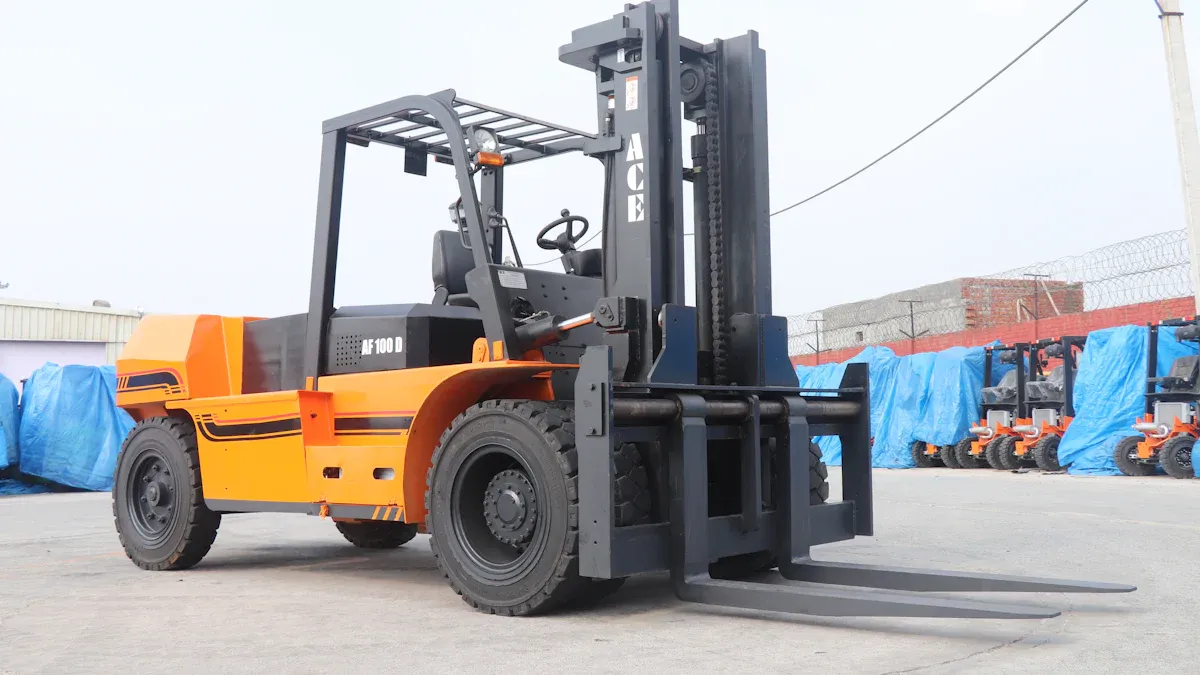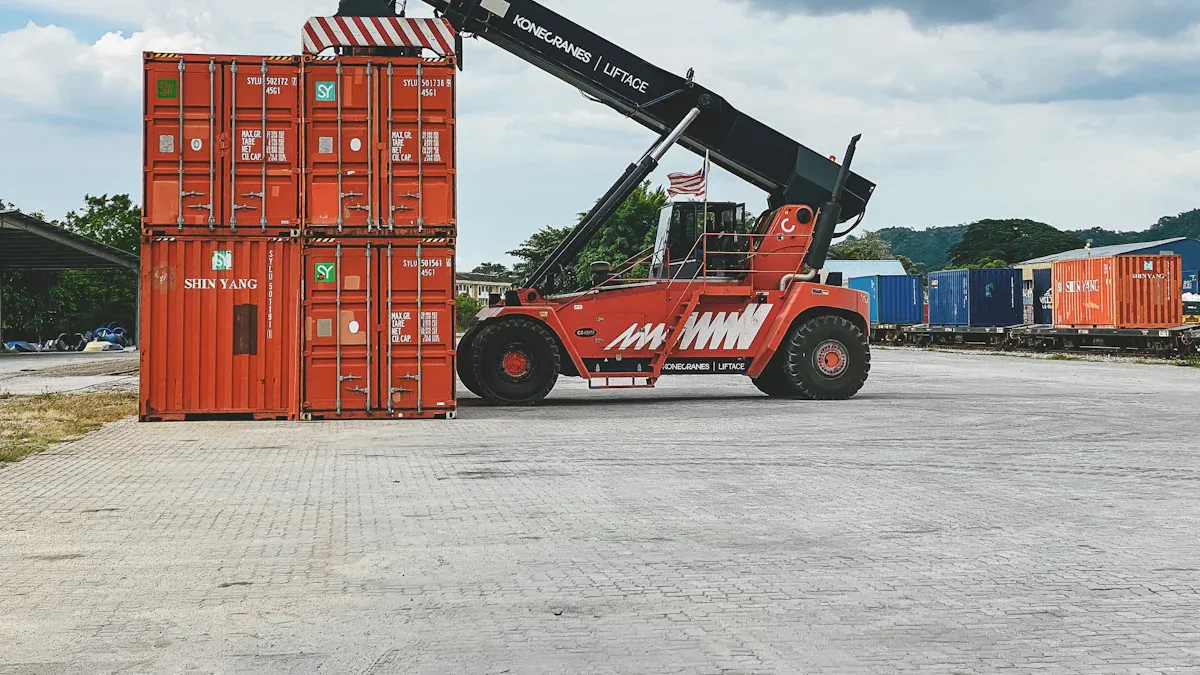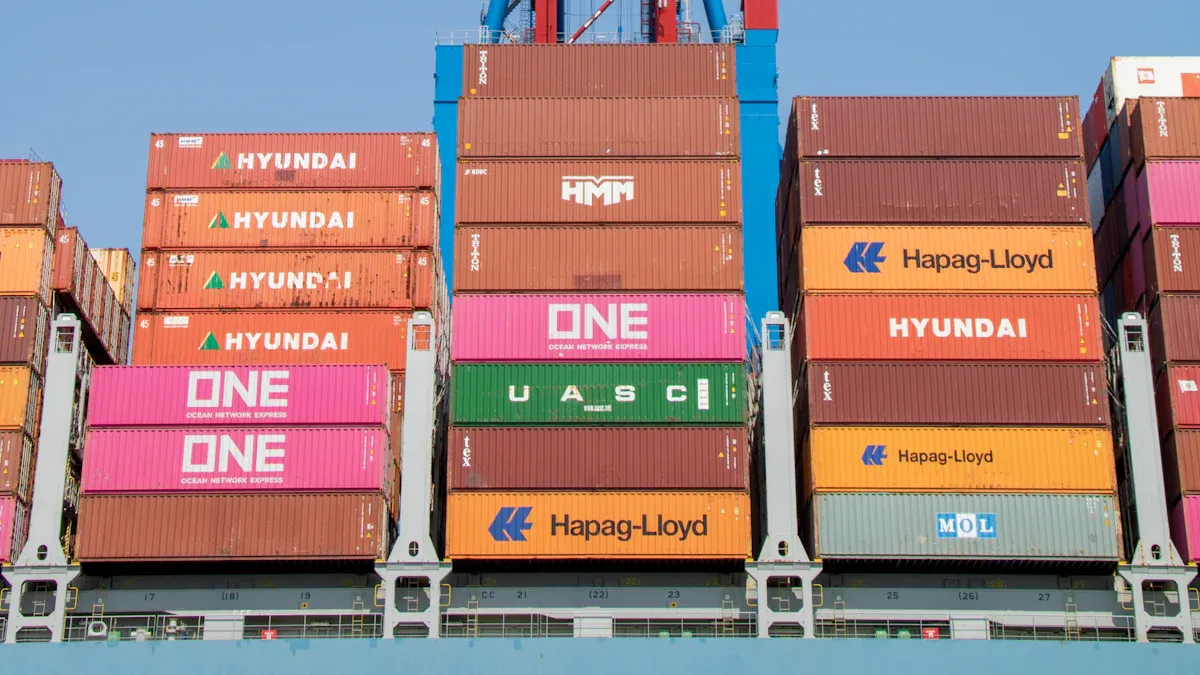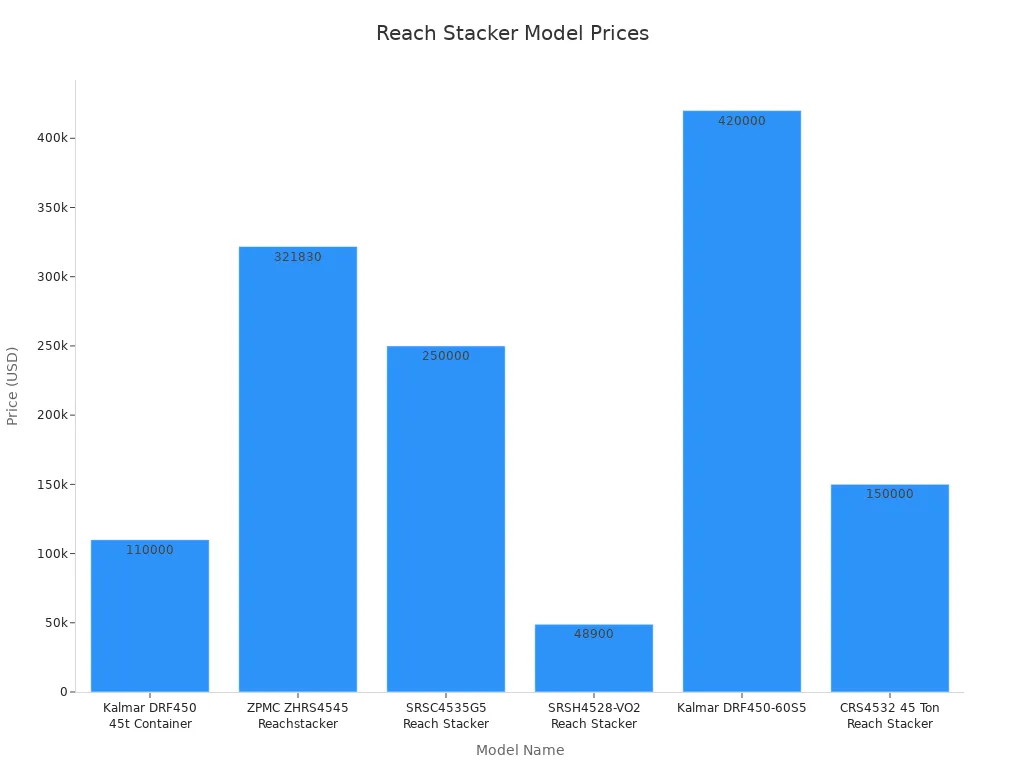

You can expect to pay anywhere from $170,000 to over $400,000 for a new reach stacker. Used models start under $20,000 and go up to about $120,000. Prices change depending on size, lifting capacity, and brand. For example, TONA-TEC, Konecranes, and Kalmar offer models with different technologies and features. The table below shows the current price ranges:
Type | Price Range |
|---|---|
New Reach Stackers | $170,000 to over $400,000 |
Used Reach Stackers | Under $20,000 to around $120,000 |
When you ask how much does a reach stacker cost, you need to consider these factors because they directly affect your budget.
Reach stacker price

New reach stacker cost
When you look at new reach stackers, you will see a wide range of prices. The reach stacker price depends on the size, lifting capacity, and technology. Small models, such as the Vestil S-118-AA-FR Walkie Reach Stacker, start at around $16,617. You can use these for lighter loads and smaller operations. If you need more power, mid-sized reach stackers cost between $130,000 and $180,000. Large models, which handle heavy containers, often cost from $190,000 up to $280,000 or more.
Electric reach stackers have become popular for their efficiency and lower emissions. You will pay about $260,000 for a new electric model. Diesel models usually range from $200,000 to $295,000. Hybrid options are rare and not widely available.
Here is a table showing typical new reach stacker price ranges by type:
Model Type | Capacity/Features | Price Range |
|---|---|---|
Small (Walkie) | 1,500 lbs | $16,617 |
Mid-sized | 30,000–45,000 lbs | $130,000–$180,000 |
Large | 45,000+ lbs | $190,000–$280,000+ |
Electric | Up to 45,000 lbs | $260,000 |
Diesel | Up to 45,000 lbs | $200,000–$295,000 |
You will find several brands offering new reach stackers. TONA-TEC provides models for container handling, intermodal, and industrial use. Konecranes, Kalmar, and Hyster also offer a variety of models. The table below lists some common brands and their application types:
Brand | Model Type | Application Type |
|---|---|---|
TONA-TEC | Container Reach Stackers | Container handling |
TONA-TEC | Intermodal Reach Stackers | Intermodal handling |
TONA-TEC | Industrial Reach Stackers | Industrial handling |
Konecranes | Container Reach Stackers | Container handling |
Kalmar | Heavy-Duty Reach Stackers | Port and terminal operations |
Hyster | RS Series | Container and bulk handling |
Tip: If you want the latest technology and full warranty, you should consider buying new. You can customize features and choose the exact specifications you need.
Used reach stacker cost
If you want to save money, you can look at the used reach stacker market. The reach stacker price for used models starts at about $12,800 for basic units. Most used reach stackers fall between $20,000 and $120,000, depending on age, condition, and brand. High-end used models from brands like Kalmar, Hyster, and Konecranes can cost up to $480,000, especially if they are recent models with low hours.
Electric used reach stackers usually cost between $40,000 and $70,000. Diesel models in the used market also fall in this range. You should check the maintenance history and inspect the equipment before buying.
Here is a table comparing used reach stacker price ranges by brand and model:
Brand/Model | Used Price Range (USD) |
|---|---|
TONA-TEC | $20,000–$120,000 |
Kalmar DRG450 | $350,000–$480,000 |
Hyster RS46 | $340,000–$470,000 |
Konecranes SMV 4531 TC5 | $360,000–$490,000 |
CVS Ferrari F500 | $330,000–$460,000 |
SANY SRSC45H9 | $320,000–$450,000 |
Liebherr LRS 545 | $340,000–$480,000 |
Toyota Reach Stacker | $330,000–$470,000 |
Hoist Liftruck FR Series | $325,000–$455,000 |
XCMG XCS4531K | $310,000–$440,000 |
JCB RS45 | $315,000–$435,000 |
You will notice that used reach stacker price varies based on several factors. These include reliability, customization options, efficiency, lifespan, and warranty. New models offer the latest technology and longer warranties, while used models provide lower cost but may have uncertain maintenance history.
Note: Always ask for service records and inspect the equipment before you buy a used reach stacker. This helps you avoid unexpected repair costs.
If you wonder how much does a reach stacker cost, you need to compare new and used options. You should consider your budget, the type of work, and the features you need. The reach stacker price reflects the value, reliability, and technology you get.
How much does a reach stacker cost: key factors

When you ask how much does a reach stacker cost, you need to look beyond the sticker price. Several key factors shape the final cost and value you get from your investment. Let’s break down the most important ones.
Brand and model
Brand reputation and model type play a major role in determining cost. Well-known brands like TONA-TEC, Kalmar, and Konecranes offer reach stackers with proven reliability and advanced technology. You often pay more for these brands, but you get better support and higher resale value.
Here’s a comparison of popular models and their prices:
Product Name | Review Score | Min MOQ | Price Range | Condition | Key Attributes |
|---|---|---|---|---|---|
TONA-TEC Container Reach Stacker | 4.9 | 1 unit | $170,000+ | New | High efficiency, robust build |
Kalmar DRF450 45t Container Handler | 5.0 | 1 unit | $110,000 | Used | Original engine, high efficiency |
ZPMC ZHRS4545 Reachstacker | 4.7 | 1 unit | $321,830 | New | 15.1m hoist height |
SRSC4535G5 Reach Stacker | 5.0 | 1 unit | $250,000 | New | Tier-4 engine, 45t capacity |
CRS4532 45 Ton Reach Stacker | 5.0 | 1 unit | $150,000 | New | Powerful engine, EPS standard |

You should compare models from TONA-TEC with other leading brands. TONA-TEC offers container, intermodal, and industrial reach stackers. Kalmar and Konecranes focus on heavy-duty and port operations. The model you choose affects how much does a reach stacker cost, especially when you factor in technology and after-sales service.
Tip: Choose a reputable brand if you want long-term reliability and easier access to spare parts.
Capacity and features
Lift capacity and special features have a direct impact on cost. Higher lift capacity means the reach stacker can handle heavier loads, but you pay more for this capability. For example, a 45-ton reach stacker costs much more than a 30-ton model.
You also need to consider attachments and advanced features. Some of the most common attachments include:
Attachment Type | Description |
|---|---|
45-Ton Container Spreader | Load, stack, and unload ISO standard containers |
Tube Spreader | Hoist and handle pipes and bulk cargo |
Combined Spreader | Transfer/stack ISO and non-stacking containers |
Log Grapple | Load and unload timber or specialty materials |
Tilt Spreader | Transport and unload bulk materials like grain and sand |
Empty-Container Spreader | Transfer and stack unladen ISO standard containers |
Extra features can also increase the cost:
Digital weight scale
Air conditioner
Fire suppression systems
Overload protection indicator
Tire pressure monitoring system
If you need advanced safety or comfort features, expect a higher price. You should match the lift capacity and features to your operation’s needs. This helps you avoid overpaying for unnecessary options.
Note: Always check if the reach stacker supports the attachments you need before you buy.
Year and condition
The year of manufacture and overall condition affect how much does a reach stacker cost. Newer models usually cost more, but they offer better technology and longer warranties. Used reach stackers can save you money, but you need to inspect them carefully.
You should look at:
Age of the machine
Maintenance history
Hours of operation
Refurbishment quality
A well-maintained used reach stacker from a trusted brand like TONA-TEC or Kalmar can deliver good performance at a lower cost. If you buy a refurbished model, check if it comes with a warranty or support package.
Tip: Ask for service records and inspect the reach stacker in person. This helps you avoid hidden repair costs.
When you consider all these factors—brand, model, lift capacity, features, year, and condition—you get a clearer picture of the total cost. You can then choose the reach stacker that fits your budget and operational needs.
Additional costs
When you buy a reach stacker, you need to plan for more than just the initial price. Ongoing ownership costs can add up over time. You should budget for maintenance, spare parts, accessories, delivery, and setup. These expenses affect your total cost and help you avoid surprises.
Maintenance and repairs
Regular maintenance keeps your reach stacker running safely and efficiently. Electric reach stackers offer longer maintenance cycles, often lasting two to three times longer than diesel models. You may only need to lubricate and inspect electric units every 1,000 hours, while diesel models require oil changes and part replacements every 500 hours. Electric models also reduce downtime and labor costs because their maintenance tasks are simpler. Diesel reach stackers need more frequent attention, which can increase your overall cost.
Tip: Choose electric reach stackers from brands like TONA-TEC if you want lower maintenance and repair costs.
Parts and accessories
You should budget for essential accessories and spare parts. These items keep your reach stacker working and help you avoid costly downtime. Consider the following when planning your expenses:
Compare prices from different manufacturers before you buy.
Maintenance costs can exceed your initial investment over time.
Emergency repairs and future replacements may affect your budget.
Popular accessories include container spreaders, log grapples, and digital scales. TONA-TEC offers a wide range of compatible parts and attachments for their models.
Delivery and setup
Delivery and setup costs depend on distance and installation complexity. Moving a shipping container across your property usually costs less than $1,000 and takes a few hours. If you need to move equipment across a city, you may need a customized quote, and the process can take weeks or months.
Distance/Complexity | Estimated Cost | Time Estimate |
|---|---|---|
Moving a shipping container across property | Less than $1,000 | A few hours |
Moving a shipping container across city | Customized quote | Weeks to months |
Note: Always ask for a detailed delivery and setup quote before you finalize your purchase.
You should include these additional costs in your budget. Planning ahead helps you manage your investment and avoid unexpected expenses.
Getting the best value
Where to buy
You have several options when you want to buy a reach stacker. You can choose from authorized dealers, online platforms, or auctions. Dealers offer new and used models with warranties and support. Online platforms let you compare prices and features quickly. Auctions sometimes provide lower prices, especially for older equipment.
Here is a table showing popular platforms for buying reach stackers:
Platform | Description | Link |
|---|---|---|
MachineryZone | Wide selection of new and used reach stackers. | MachineryZone |
Tito Lifttrucks | Specializes in used reach stackers with shipping and assembly. | Tito Lifttrucks |
Forklift International | Lists many used reach stackers for sale. | Forklift International |
You should also check reputable brands like TONA-TEC. Their reach stackers offer strong reliability and support. You can view their full product range at their official site.
Tip: Compare prices and features across platforms before you decide.
Negotiating price
You can lower your purchase cost by using smart negotiation strategies. Here are steps you can follow:
Know your business needs and goals. This helps you focus on what matters most.
Learn about the seller’s situation. Understanding their pressures can help you negotiate better.
Be honest and build trust. Sellers respond well to genuine buyers.
Aim for a win-win deal. Both sides should feel satisfied with the outcome.
Set up a plan to review and assess the deal. This keeps your purchase on track.
Auction prices for used reach stackers are usually lower than dealer prices. The difference is shrinking, especially for machines 7-10 years old. In the next few years, auction and dealer prices may only differ by 10% to 15%. More buyers now look for used equipment, which affects the price gap.
Note: Always ask for service records and inspect the machine before you agree to a price.
Total cost of ownership
You need to look beyond the initial price when you ask how much does a reach stacker cost. The total cost includes maintenance, repairs, parts, accessories, delivery, and setup. Electric models often have lower maintenance needs. Diesel models may require more frequent service. You should budget for these ongoing expenses to avoid surprises.
Cost Type | Description |
|---|---|
Maintenance | Regular service, oil changes, inspections |
Repairs | Unexpected breakdowns, part replacements |
Accessories | Attachments, spreaders, safety features |
Delivery & Setup | Transport and installation |
Choosing a reliable brand like TONA-TEC helps you reduce long-term costs. Their support and parts availability make ownership easier.
Tip: Always calculate the total cost before you buy. This helps you make a smart investment.
When you ask how much does a reach stacker cost, you see a wide range. New models usually cost between $150,000 and $500,000, while used units can be much less. Here is a quick overview:
Description | Price Range |
|---|---|
Initial cost | USD 150,000 to USD 500,000 |
Key factors like total cost of ownership, maintenance, and resale value shape your investment. You should review your needs and budget before buying. For reliable options, consider trusted brands such as TONA-TEC.
FAQ
How do you choose the right reach stacker for your operation?
You should look at your lifting needs, work environment, and budget. Consider the type of loads and frequency of use. TONA-TEC offers models for container handling, industrial, and intermodal tasks.
What is the average lifespan of a reach stacker?
You can expect a reach stacker to last 10 to 15 years with regular maintenance. Usage hours and care affect lifespan. Electric models often need fewer repairs over time.
Can you finance a reach stacker purchase?
Most dealers and manufacturers offer financing options. You can choose monthly payments or leasing plans. Ask TONA-TEC or your local dealer for details.
What safety features should you look for?
You should check for overload protection, fire suppression systems, and digital weight scales. Modern reach stackers often include tire pressure monitoring and ergonomic controls.
Tip: Always review the safety features before you buy. This helps protect your team and equipment.
How much does maintenance cost each year?
Annual maintenance costs range from $5,000 to $15,000. Electric models usually cost less to maintain than diesel ones. You should budget for regular inspections and part replacements.
Model Type | Estimated Annual Maintenance Cost |
|---|---|
Electric | $5,000–$8,000 |
Diesel | $10,000–$15,000 |









